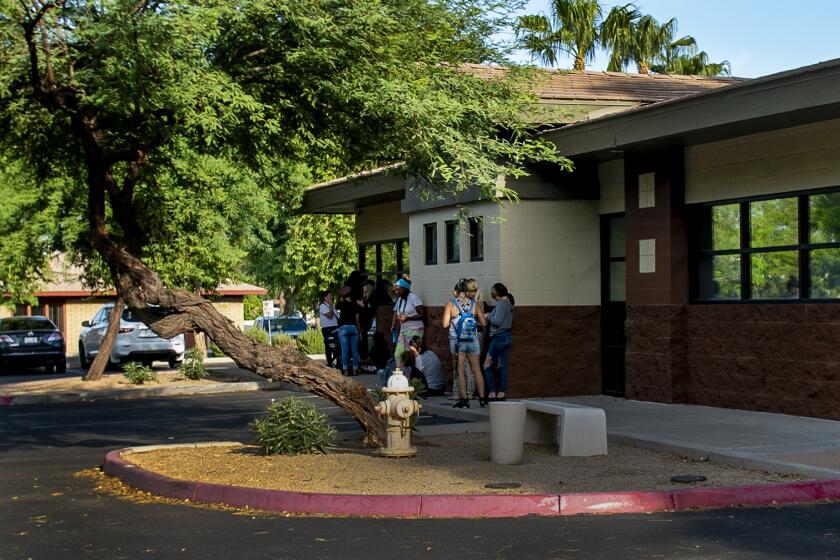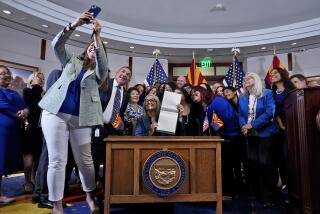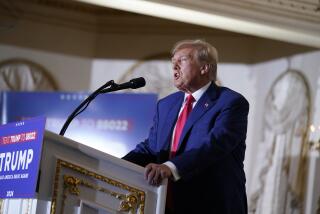Abortion ban has supercharged Arizona politics. What will GOP legislators do?

PHOENIX — Abortion politics and policy are clashing here like in no other state as the Republican-led Legislature convenes Wednesday to sort out the aftermath of a ruling allowing a statewide ban to take effect within weeks.
It adds more uncertainty for a state that has sometimes felt like the center of the political universe since President Biden’s 2020 victory here helped seal his election, prompting the first false cries from former President Trump that the election was rigged.
Republicans here are anxious and divided over how to handle the newest political surprise, delivered last week when the state Supreme Court ruled that a nearly complete ban — which had been on the books since 1864, before Arizona became a state — could take effect. The state currently permits abortions until the 15th week of pregnancy.
The focus on abortion, already a rallying cause for Democrats, has bolstered that party’s belief that it can use its support for reproductive rights to overcome voters’ angst over the economy and immigration and win a state that has gone their way in only two presidential elections since 1948. But leaders of an abortion rights ballot measure are trying to keep the party at arm’s length because they believe they can win broader support from Republicans and independents.
Vice President Kamala Harris has failed to win over a majority of voters or convince them that she is ready to step in if Biden, the oldest president in history, falters.
Still, the increasing number of rallies, signature-gathering events and political speeches over the last week are making the November election feel much more urgent here than in other parts of the country, where campaigns do not normally draw attention until the early fall.
“This is a huge political situation,” said state Sen. Anna Hernandez, a Democrat from Phoenix, who said she has heard from constituents in both parties who are upset with the near-total ban.
A Tuesday morning rally on a highway beside a strip mall, one of dozens around the state in the last week, drew more than 30 people waving “Remember in November” signs and carrying handcuffs to underscore the 1864 abortion statute’s threat of arrest for people who perform or help a woman obtain one. One man held a picture of Trump’s face covered by a red slash.
“It’s horrifying. It’s absolutely dangerous for all women — whether they want to be pregnant, whether they don’t want to be pregnant,” said Nancy Gillenwater, 63, a Scottsdale resident who said she had an abortion when she was 14 and another at 41, after having children.
Gillenwater, who became an active Planned Parenthood volunteer and storyteller when the U.S. Supreme Court overturned nationwide abortion rights in 2022, said she worries that her daughter can’t safely start a family and that her son-in-law, an emergency room physician, will face criminal prosecution for saving women’s lives.
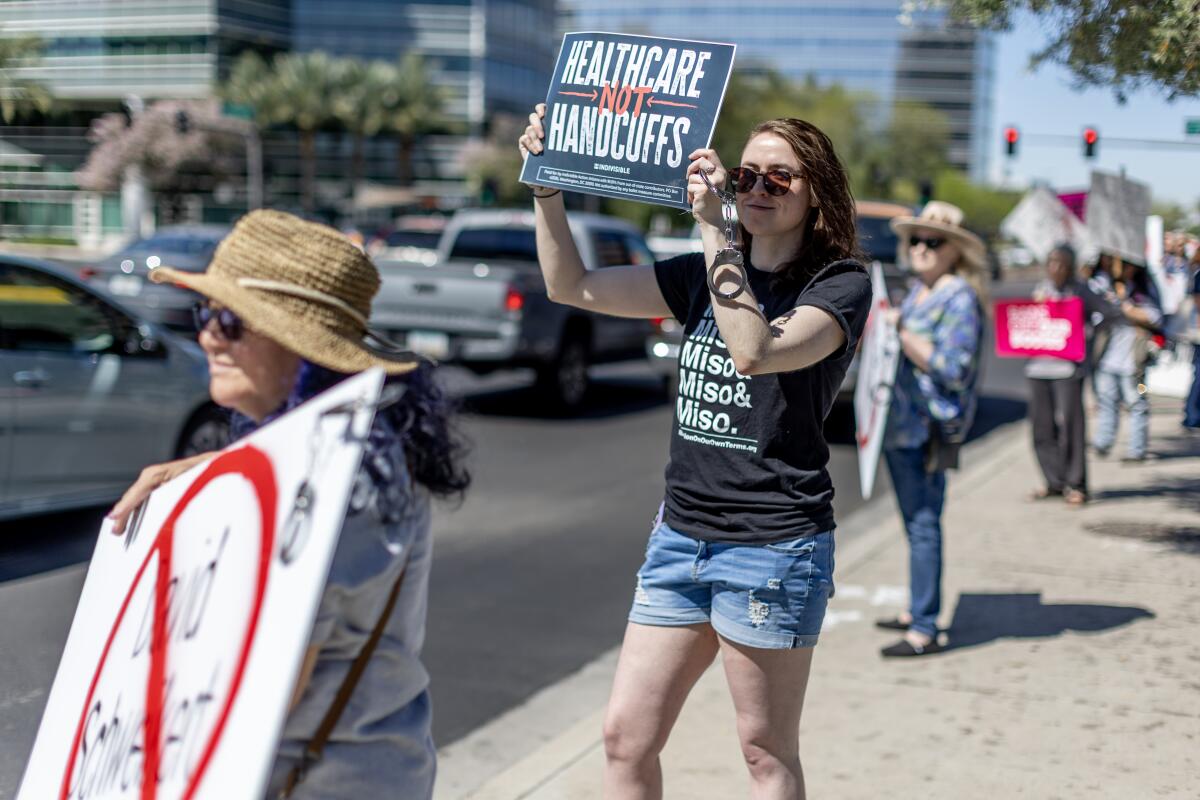
Mari Urbina, national managing director of Indivisible, the anti-Trump group that organized the rally, had flown in from Washington to support state efforts. She said that since the state Supreme Court’s decision, her group had signed up hundreds of volunteer organizers here who agreed to contact friends and neighbors. Other left-leaning groups reported similar spikes in fundraising and activism.
The Legislature is looking at a pair of issues that will shape the short-term and long-term future of abortion here: whether to repeal the 1864 law, and whether to add more ballot questions to put before voters in the November election to compete with the abortion rights measure.
But Republicans, who hold one-vote majorities in Arizona’s House and Senate, are internally conflicted between the desire to impose strict abortion restrictions and the political reality that the issue could cost them elections, including the presidency.
Those dynamics erupted into a chaotic session last Wednesday, the day after the state Supreme Court ruling, with cries of “Shame! Shame!” and no action.
Since then, Republicans have been strategizing behind closed doors, with public pressure from Trump, who had previously said states should decide abortion law on their own, “to remedy what has happened.”
Repealing the 1864 measure would draw unanimous support from Democratic lawmakers and need the votes of only two Republicans in each chamber.
Even before the court ruled last week, abortion rights proponents said they had gathered enough signatures to put a statewide measure on the ballot that would lift virtually all abortion restrictions, including the current legal ban after 15 weeks. Two of the state Supreme Court justices who supported last week’s ruling will also be on the November ballot, which could draw more interest from abortion rights voters.
Abortion is the top issue for suburban women in seven swing states, according to a Wall Street Journal poll in March, in which 39% of those respondents cited the issue, far surpassing immigration (16%) and the economy (7%) in the seven states polled, including Arizona.
“I’m not saying that’s the deciding factor. But it’s the biggest factor, because we women vote,” said Nancy Musser, a 69-year-old Democrat who works an administrative job in the Maricopa County probation department.
The Arizona Supreme Court’s ruling Tuesday made abortions illegal, except when a mother’s life is at risk. Attention quickly turned to the November election.
Republicans are worried about that abortion rights measure and are considering how to counter it.
An internal GOP strategy presentation, first reported by NBC, showed Republicans were considering placing one or two competing measures on the November ballot that would draw down support from the abortion rights measure.
One idea under discussion would ask voters to consider what the presentation called “a 14-week law disguised as a 15-week law.” The Legislature can place measures on the ballot directly, and Democratic Gov. Katie Hobbs has no legal right to veto them.
Dawn Penich, communications director for Arizonans for Abortion Access, which is sponsoring the abortion rights measure, accused the Legislature of “deception and political game-playing.”
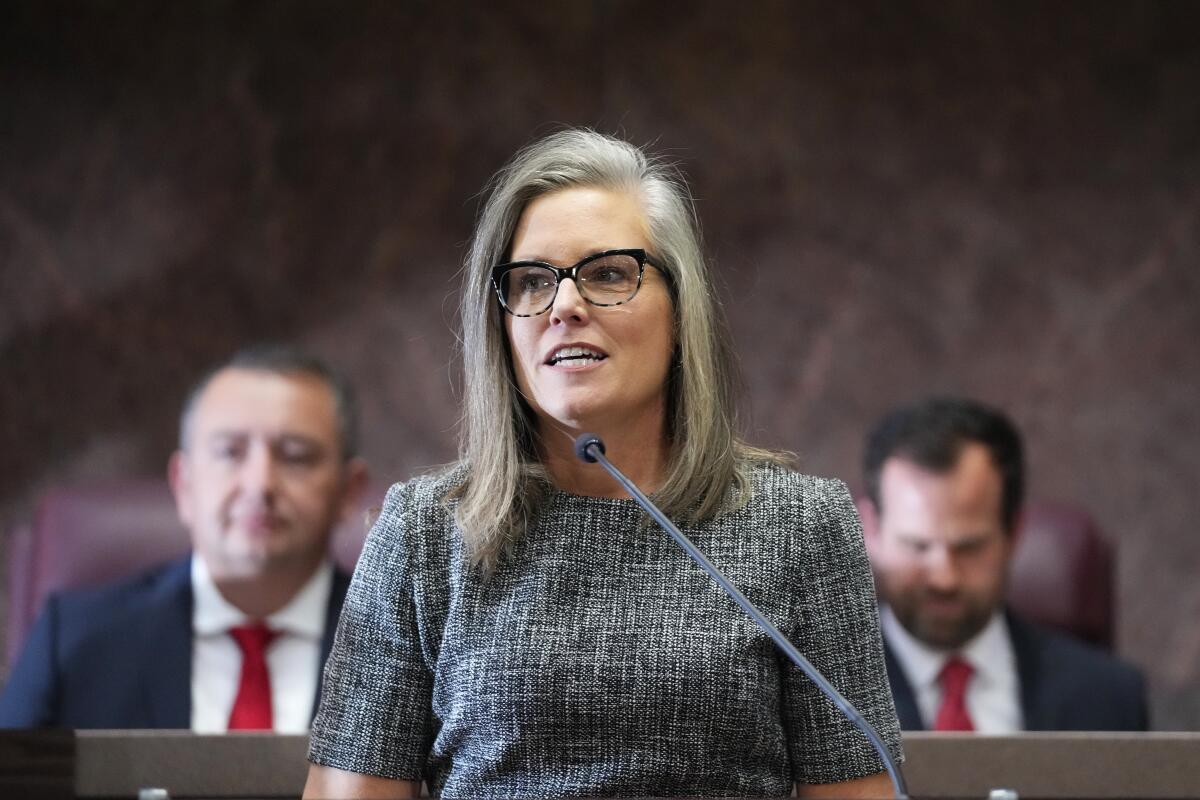
Republican House Speaker Ben Toma said in a statement: “The document presents ideas drafted for internal discussion and consideration within the caucus. I’ve publicly stated that we are looking at options to address this subject, and this is simply part of that.”
Even if the issue of abortion helps Democrats, there is no guarantee it will help Biden win the state, where many voters cite the economy as their top concern. The same Wall Street Journal poll of swing state voters found Trump leading in Arizona by 5 percentage points, and receiving much higher marks on the economy and immigration.
“Women should be able to decide,” said Nick Tsontakis, a 68-year-old architect. But he will vote for Trump, he said, feeling satisfied with Trump’s position that abortion laws should be up to the states.
Jose Salvador, a 42-year-old Democrat, agrees, calling the Supreme Court’s decision a mistake. But after voting for Biden in the last election, he has decided to vote for Trump, largely due to immigration and the economy, he said.
“Right now, the country is hurting financially,” he said. “And we need to take care of that first before we focus our resources on on this other issue.”
More to Read
Get the L.A. Times Politics newsletter
Deeply reported insights into legislation, politics and policy from Sacramento, Washington and beyond. In your inbox three times per week.
You may occasionally receive promotional content from the Los Angeles Times.


